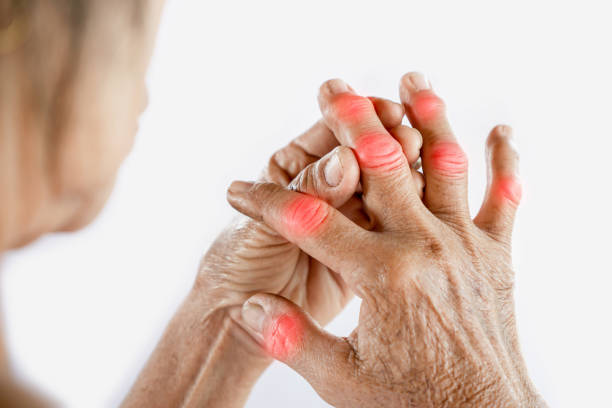Have you ever woken up in the morning to find your once slender and nimble dingers transformed into swollen, puffy sausages? If so, you’re not alone. A significant number of people around the world wake up to swollen fingers, grappling with discomfort and uncertainty about its cause. Did you know that a staggering 1 in every 4 adults experience morning hand swelling at some point in their lives? Is it something serious that warrants immediate attention, or is it just a harmless quirk of the human body? Today, we dive deep into the root causes of why your fingers may swell when you wake up and what you can do about it.
As a hand surgeon with years of experience, I’ve witnessed firsthand the distress and discomfort that swollen fingers can cause to countless patients. The pain points are numerous- from the inconvenience of being unable to perform simple tasks to worrying about underlying health conditions causing the issue.
My motivation of writing this article stems from a desire to shed light on this common but often overlooked concern and provide answers that empower you to take control of your hand health.
This article not only delves into the reason behind the swelling of the fingers but also discusses the related aspects, including :
- How to reduce swollen fingers
- Swollen finger due to injury
- Swollen fingers in winter
- Home treatment for swollen fingers in winter
- Can a heart condition cause swollen hands?
- Can dehydration cause swollen fingers in the morning?
We hope by the end of this article you will be equipped with valuable insights and actionable steps to reclaim comfort and dexterity in your hand.
Let’s look at the reason behind the swollen fingers
Why are my fingers swollen in the morning?
Several factors contribute to this phenomenon of swollen fingers, and understanding them can help you find effective ways to reduce the discomfort and reclaim comfort in your hands. Here is the key to consider:
Fluid Accumulation: Overnight, your body’s circulation slows down, causing fluid to accumulate in the tissue, including the fingers. This nature process can lead to puffiness and swelling when you wake up.
Lifestyle habits: Certain lifestyle habits can exacerbate fluid retention and contribute to morning finger swelling. High sodium diets, excessive alcohol consumption, and a sedentary lifestyle can all play a role in this condition.
Arthritis: If you have arthritis, the inflammation of your joints can lead to swollen hands in the morning. Different types of arthritis can result in swollen hands and swollen fingers in the morning. This includes:
- Osteoarthritis: Also called degenerative joint arthritis, this condition affects the cartilage between your joints.
- Rheumatoid arthritis: This autoimmune disorder affects your joints and other parts of your body.
- Cervical spondylosis: This common, age-related condition affects the joints in your cervical spine (neck area). It can lead to finger pain and swelling.
Pregnancy: When someone is pregnant, their body releases 50 percent more fluids and blood. Some of that excess fluids and blood can fill tissue in your hands, ankles, and feet.
Kidney disease: Swelling in your extremities can be a result of water retention. The kidneys remove excess fluid and toxins to cleanse the body. Swelling in your hands could be a sign that your kidney isn’t functioning properly.
Hormonal imbalances: Hormonal imbalances, such as those that occur during menopause, can also cause swelling in the hands and fingers.
Poor sleep position: For some people, swollen hands in the morning are a sign of sleep posture. If you sleep on your hands and put the majority of your weight on your side, your coils wake up with swollen hands.
So as we had discussed the reasons now it’s time to look at some of the treatments available for swollen fingers.
How to reduce swollen fingers
Better sleep position: change your sleeping position throughout the night. Consider elevating your hands while sleeping by using an extra pillow or cushioning to promote fluid drainage.
Hydration: Staying hydrated is crucial in preventing fluid retention. Make sure to drink plenty of water throughout the day to maintain a healthy fluid balance in your body.
Dietary consideration: Avoid excessive salt intake and try to incorporate foods rich in potassium, as it helps balance sodium levels in the body, reducing the likelihood of swelling.
Arthritis treatment: Arthritis treatment focuses on the relief of symptoms and enhancement of joint functions. In some cases, doctors recommend surgery such as joint repair or joint replacement. For some people, physical therapy can help improve range of motion and strength. Also, depending on the type of arthritis, doctors often recommend medications such as
Hand exercises: Gentle hand exercises can stimulate blood flow and reduce swelling. Simple movements like clenching and releasing your fists, stretching your fingers, and rotating your wrist can be beneficial.
Avoid prolonged inactivity: Try to avoid prolonged periods of inactivity. Regularly moving your fingers and hands can help prevent stiffness and promote circulation.
Consult a hand surgeon: If the swelling persists or is accompanied by other concerning symptoms, it’s essential to consult a hand surgeon for a comprehensive evaluation and personalized advice.
By understanding the causes of morning finger swelling and implementing practical solutions, you can take control of your hand health and enjoy pain-free mornings.
Now, let’s delve into some other situations that can lead to swollen fingers and explore effective treatment options for each case.

Swollen Fingers in Winter
As the temperature drops during winter, many individuals notice an increase in finger swelling. The colder weather can cause blood vessels in the extremities to constrict, reducing blood flow and slowing down fluid circulation. Additionally, spending more time indoors with artificial heating can lead to dehydration, which can further exacerbate the swelling of the fingers.
Home Treatment for Swollen Fingers in Winter
Dealing with swollen fingers during the winter months can be challenging, but there are several effective home treatments you can try to find relief and keep your fingers comfortable and functional throughout the cold season. Here are the key points to consider:
Stay hydrated: During winter, the air tends to be drier, both indoors and outdoors, which can lead to dehydration. Make sure to drink sufficient water throughout the day to counteract the effects of the dry air and reduce the likelihood of finger swelling.
Protective Gloves: When you venture outdoors, be sure to wear warm gloves to shield your hands from the cold weather. Keeping your hands protected can help maintain blood flow and reduce the impact of temperature changes on your fingers.
Warm beverages: Enjoying warm herbal teas or other beverages will not only be soothing in the cold weather but also help keep you hydrated.
Hand exercises: Engage in regular hand exercises to stimulate blood flow and prevent stiffness, which is especially crucial during winter when we tend to stay indoors more. Simple exercises like clenching and releasing your fists, stretching your fingers, and rotating your wrist can make a difference.
Stay Active: Regular physical activity can help improve blood circulation and reduce swelling. Even simple activities like taking short walks or doing light exercises can make a difference.
Reduce salt intake: Excessive salt intake can contribute to fluid retention, exacerbating finger swelling. Try to limit your salt intake and opt for foods that are lower in sodium.
Swollen Finger Due to Injury
While morning finger swelling is often attributed to causes like fluid retention, sometimes it can be a result of an injury. Trauma to the hand, such as a sprain, fracture, or dislocation, can lead to localized swelling and pain. Injuries can damage blood vessels and tissues, triggering the body’s natural inflammatory response, resulting in swelling as a proactive mechanism.
If you notice swelling in your fingers following an injury, it’s essential to take immediate action. Apply the RICE method – Rest, Ice, Compression, and Evaluation. It helps minimize swelling and support the healing process. Give your hand ample time to rest, apply ice wrapped in a cloth to the affected area for 15-20 minutes every few hours, use a compression bandage to control swelling, and keep your hand elevated above heart level as much as possible. However, it’s essential to remember that not all injuries are immediately visible, and delayed swelling or persistent pain should prompt a visit to a hand surgeon for a thorough examination and proper diagnosis.
Now let’s look at some common doubts regarding Swollen fingers
Can Heart conditions cause swollen hands?
In some instances, swollen hands, including the fingers, can be a symptom of an underlying health condition, such as heart disease. Heart conditions can affect the body’s ability to pump blood effectively, leading to fluid retention in the hands and other externities. When the heart is not functioning optimally, blood can back up in the veins, causing swelling and edema.
If you experience persistent and unexplained swelling in your hands, especially if it is accompanied by shortness of breath, fatigue, or chest pain, it’s crucial to seek immediate medical attention. A thorough evaluation by a healthcare professional, including a hand surgeon, can help determine the cause of the swelling and identify any underlying health issues that may require treatment.
Can Dehydration cause swollen fingers in the Morning?
Dehydration can indeed play a role in morning finger swelling. When the body lacks adequate water, it tends to retain fluids to compensate for the deficiency. As a result, the hands and fingers can become swollen as the excess fluid accumulates in the tissues overnight.
To prevent dehydration-induced finger swelling, ensure that you are consuming enough water throughout the day. On average, adults should aim to drink at least 8-ounce glasses of water daily, though individual needs may vary depending on factors like activity level and climate. Additionally, limit your intake of dehydrating beverages like caffeinated and alcoholic drinks, as they can exacerbate fluid loss. By staying well-hydrated, you can help regulate your body’s fluid balance and reduce the likelihood of waking up to swollen fingers in the morning.
Conclusion
As we approach the end of our journey, I trust that you now have a clearer understanding of the different aspects of swollen hands. We’ve explored the various factors that contribute to this common yet puzzling issue, ranging from natural fluid accumulation to lifestyle habits and seasonal changes. Armed with understanding, you can now take proactive steps to reduce finger swelling and find relief from discomfort.
By staying hydrated, engaging in hand exercises, and making mindful dietary choices, you can actively manage morning finger swelling and promote better hand health.
So, next time you wake up to swollen fingers in the morning, don’t fret! Armed with the knowledge gained from this article, you can take control of your hand health and ensure that your fingers are ready to tackle whatever the day may bring.
Stay proactive, stay informed, and embrace the job of the hands that can accomplish anything.

